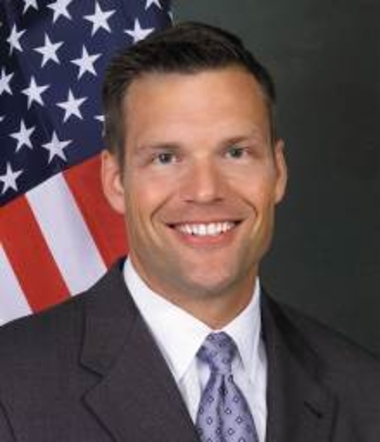Kansas Secy of State proposes discriminatory voting scheme

The Wichita Eagle, Oct. 17
Section 1 of the Kansas Bill of Rights states that we are all equal. But when it comes to voting and filing taxes, some Kansans are less equal than others.
Secretary of State Kris Kobach is pushing a bizarre plan to create two categories of voters: those who can vote in all elections and those who can vote only in federal races.
Kobach's scheme is his response to a U.S. Supreme Court ruling in June barring states from having more voter-registration requirements than those established by Congress. Kansas' law requires new voters to provide proof of their U.S. citizenship, while federal law requires only that they pledge they are citizens under penalty of perjury.
Rather than admit that the state overstepped and call for the Legislature to rescind Kansas' law, Kobach concocted a two-tiered system in which Kansans who legally register but don't provide documented proof of citizenship (about 18,000 people so far) would be allowed to vote for president and members of Congress but not in state and local elections. ...
The Kansas Department of Revenue also announced that it is requiring same-sex married couples to file their taxes differently from other Kansans. The notice is in response to another U.S. Supreme Court ruling in June that invalidated the federal Defense of Marriage Act. The IRS followed up on that ruling by deciding that any legally married couple should file federal tax returns as married individuals, regardless of whether they live in a state that sanctions same-sex marriage.
Married couples use their federal filing status as the basis for their Kansas taxes. The KDOR notice goes against that law and requires legally married same-sex couples to file state tax returns separately and use a special work sheet to divide their income and deductions.
State officials are trying to balance the court's ruling with a 2005 Kansas constitutional amendment declaring marriage as between "one man and one woman only." But some argue that the new policy is contrary to the part of the amendment stating that "no relationship, other than a marriage, shall be recognized by the state as entitling the parties to the rights or incidents of marriage."
"As written, and as understood by the U.S. Supreme Court, it would appear any legally married couple - gay or straight - are entitled to be recognized as such in Kansas," a Hays Daily News editorial argued.
Kobach's scheme and the KDOR requirement likely will be challenged in court. But until the courts intervene, some Kansans will be treated like second-class citizens.
October 22, 2013





